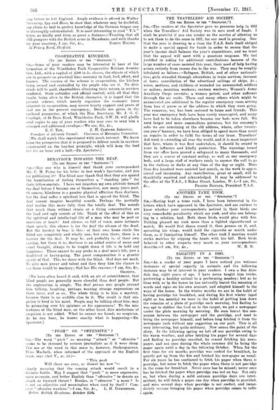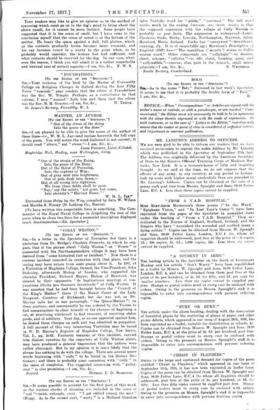SAGACITY IN A DOG.
ITo THE EDITOR OF ran " SPECTSTOR."1 Ssa,—As a reader of your paper I have noticed you welcome instances of special sagacity in animals, and the following instance may he of Interest to your readers. I own a fine Aire- dale dog, eight years of age. I have never taught him tricks, preferring a healthy animal to a performing monkey; but as he lives with us in the house he has naturally learnt the meaning of words and signs on his own account, and adapted himself to the ways of the house. In the winter months we are in the habit of having porridge for breakfast, and during his first winter (aged eight or ten months) we were in the habit of putting him down tine remains of a plate of porridge each morning, but finding he was apt to slobber the food on to the carpet, we put a newspaper under the plate morning by morning. He soon learnt the con- nexion between the newspaper and tine porridge, and used to bring the newspaper himself, and before long fetched it from the newspaper reek without any suggestion on our part. This is all very interesting, but quite ordinary. Now comes the point of the story, In the following spring we left off our porridge owing to the warm weather, and after fetching his paper for several days and finding no porridge resulted, he ceased fetching his news- paper, and not once during the whole summer did he bring the paper again until a day in the following October. When for the first time for six months porridge was cooked for breakfast, he quietly got up from the fire and fetched his newspaper as usual. For six years ho has continued to fetoh his paper when there is porridge, but never to fetch the paper when there is not porridge in the room for breakfast. Never once has he missed; never once has he fetched the paper when porridge was not on tap. Not only BO, but when during a mild autumn porridge days are inter- mittent, he will fetch a paper one day when porridge is provided, and miss several days when porridge is not cooked, and imme- diately resume bringing his paper when porridge comes to table again.
Your readers may like to give an opinion as to the method of reasoning which must go on in the dog's mind to bring about the above result, for it cannot be mere instinct. Some people have suggested that it is the sense of smell, but I hose come to the conclusion myself that the sense of sound is at the bottom of the matter. He hears the spoon against a dull, full platter, which as the contents gradually lessen becomes more resonant, and his ear becomes tuned to a nicety to the point when, as he probably would consider, the human has had sufficient, and what remains should be reserved for the dog. In any case, what- ever the reason, I think you will admit it is a rather remarkable and unusual case of animal sagacity.—I am, Sir, he., F. W. S.















































 Previous page
Previous page